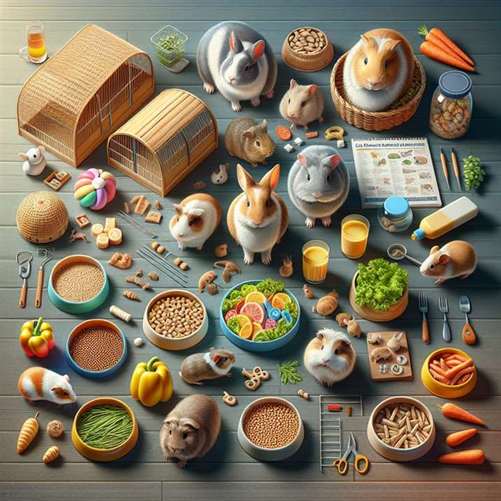Care Tips for Small Mammal Pets Every Owner Should Know
Introduction
If you’re thinking about adding a small mammal to your family, you’re not alone. The popularity of small mammal pets has surged in recent years, and for good reason. These adorable creatures, ranging from guinea pigs to hamsters, can bring joy, companionship, and even a bit of mischief into your home. However, to ensure your new furry friend thrives, understanding care tips for small mammal pets is crucial. This article will provide you with essential insights and actionable advice that every small mammal pet owner should know.
In today’s fast-paced world, the significance of having pets has become increasingly evident. Recent studies indicate that pet ownership can improve mental health, reduce stress, and provide a sense of purpose. Small mammals, in particular, are often seen as ideal pets for families, especially those living in apartments or homes with limited space. They’re generally easier to care for than larger pets, making them perfect for beginners.
Throughout this article, we will cover various aspects of care tips for small mammal pets, including nutritional needs, habitat requirements, grooming, and socialization tips. By the end, you’ll have a comprehensive understanding of how to create a loving and healthy environment for your small mammal. So, whether you’re a seasoned pet owner or a newbie, you’re bound to find valuable information that will help you nurture your new companion.
To get started, let’s dive into what care tips for small mammal pets really entails and why it’s essential for every owner.
What is Care tips for small mammal pets?
Definition
Care tips for small mammal pets refer to the essential guidelines and best practices designed to help pet owners provide the best possible environment for their small furry friends. These tips encompass a variety of aspects, including feeding, housing, grooming, health care, and socialization. Each type of small mammal has unique needs, and understanding these can make a significant difference in their well-being.
Historical Context
The trend of keeping small mammals as pets has been around for decades, but it has seen a notable resurgence in recent years. Historically, small mammals like rabbits and hamsters were often seen as “starter pets” for children. However, as pet ownership has evolved, so has our understanding of these animals’ needs. Today, many people appreciate the complexity and companionship small mammals offer, leading to a more informed and dedicated approach to their care.
The Importance of Care tips for small mammal pets
Understanding the care tips for small mammal pets is more critical than ever. As the pet industry continues to grow, so does the availability of resources and information. Many small mammal owners are now looking for ways to ensure their pets lead healthy, happy lives. Moreover, with the rise of social media, pet owners can easily connect, share experiences, and learn from one another, fostering a community dedicated to responsible pet ownership.
Care tips for small mammal pets in the Context of Pet Ownership
The role of small mammals in modern pet ownership cannot be understated. The rise of urban living has led many individuals and families to seek pets that are more manageable in size and care requirements. Small mammals fit perfectly into this niche, offering companionship without the extensive space and time commitments larger pets often require.
Key Players in the Small Mammal Pet Care Industry
Several key players contribute to the landscape of small mammal pet care, including pet supply companies, veterinarians specializing in exotic pets, and experienced pet owners. Resources like Complete Guide to Small Mammal Pet Care offer invaluable information for new and seasoned owners alike.

Essential Care tips for small mammal pets
Nutrition
Feeding your small mammal the right diet is crucial for their health and well-being. Here’s a breakdown of nutritional needs for common small mammals:
- Guinea Pigs: Require a diet high in vitamin C. Fresh vegetables and specially formulated guinea pig pellets are essential.
- Hamsters: Thrive on a mix of pellets, seeds, and fresh fruits or vegetables. Avoid citrus fruits, which can upset their stomach.
- Rabbits: Their diet should consist primarily of hay, supplemented with fresh vegetables and limited pellets.
- Gerbils: Enjoy a seed-based diet but also benefit from occasional fresh produce.
Key Takeaway: Always ensure that your small mammal has fresh water available at all times. Hydration is vital for their health.
For more detailed dietary guidelines, check out What Small Mammal Pet Food Should You Buy?.
Housing Requirements
Creating a safe and comfortable habitat is crucial for your small mammal’s well-being. Here’s what to consider:
- Space: Ensure your pet has enough space to move around and explore. Each small mammal has specific space requirements.
- Bedding: Choose appropriate bedding materials that are safe and absorbent. Avoid cedar or pine shavings, as they can be harmful to small mammals.
- Enrichment: Provide toys and tunnels to stimulate their minds and encourage physical activity. This helps prevent boredom and promotes overall health.
Tip: Regularly clean their living space to prevent odors and maintain a healthy environment.
For more insights on creating the perfect habitat, explore Best Small Mammal Pet Cages for Every Budget.
Grooming
Regular grooming is vital for your small mammal’s health and comfort. Here are some grooming tips for different types of small mammals:
- Rabbits: Require regular brushing to prevent matting and reduce shedding. Pay special attention during seasonal changes.
- Guinea Pigs: Regular brushing helps keep their coats healthy, especially for long-haired breeds.
- Hamsters: They generally groom themselves but benefit from occasional baths using small animal-safe products.
- Gerbils: Minimal grooming is needed, but ensure their environment is kept clean.
Tip: Introduce grooming gradually to avoid stress. Use positive reinforcement to make the experience enjoyable.
Health Care
Regular veterinary check-ups are essential for your small mammal’s health. Here are some health care tips:
- Vaccinations: Some small mammals require vaccinations, so consult your vet for specific needs.
- Signs of Illness: Be observant of changes in behavior, appetite, or appearance, as these can indicate health issues.
- Dental Care: Overgrown teeth can be a significant issue for many small mammals. Provide chew toys to help wear down teeth naturally.
Important: Establish a relationship with a veterinarian who has experience in treating small mammals for specialized care.
For a deeper understanding of health care, read our How to Improve Small Mammal Pet Health.
Socialization
Social interaction is vital for small mammals. Here’s how to ensure your pet is well-socialized:
- Handling: Start handling your small mammal gently and consistently from a young age to build trust.
- Playtime: Dedicate time each day for play and interaction. This strengthens your bond and provides essential mental stimulation.
- Companionship: Consider keeping pairs of social small mammals, like guinea pigs or rabbits, to prevent loneliness.
Tip: Always supervise interactions between small mammals and children to ensure safety for both.
For more on socialization, check out our guide on Socializing Small Pet Mammals.
Future Trends in Small Mammal Care
As the pet care industry continues to evolve, so do the trends surrounding small mammal care. Here are a few emerging trends to watch:
- Sustainable Products: Many pet owners are becoming more environmentally conscious, leading to a rise in eco-friendly pet products.
- Technology Integration: Innovations like habitat monitoring systems and automated feeders are becoming more common, helping owners ensure their pets are happy and healthy.
- Community Engagement: Online forums and social media groups are fostering communities that share tips, experiences, and support for small mammal owners.
Staying informed about these trends can enhance your pet care strategies and ensure your small mammal receives the best possible care.
Conclusion
In conclusion, understanding care tips for small mammal pets is essential for anyone considering adding one of these delightful creatures to their home. From nutrition and housing to grooming and health care, each element plays a crucial role in your pet’s happiness and well-being. By following the advice outlined in this article, you can create a nurturing environment that allows your small mammal to thrive.
Remember, being a responsible pet owner means staying informed and continuously learning. For more resources and tips, feel free to explore our extensive collection of guides on small mammal care.
With the right approach and dedication, your small mammal can become a cherished member of your family, bringing joy and companionship for years to come. Happy pet parenting!
If you have any questions or want to share your experiences with small mammal pets, feel free to join our discussion at the Small Mammals Forum.
Resource Links:
- lafeber.com: … To Free-Range Or Not? rat walking out cage door Should you let your rats roam freely outside the cage? Brandi Saxton of It’s A Rat’s World.
- academyanimal.com: … … care of yourself in an emergency, whether it’s big or small. The … Here are five tips connected to pet first aid that every owner should know.
- vox.com: … (In 2016, about one-fifth of dog owners and half of cat owners didn’t bring their animal in for routine or preventive care, which is highly …




0 Comments